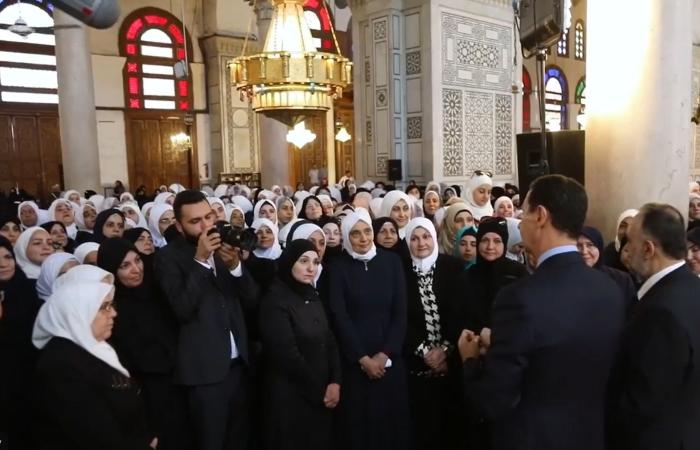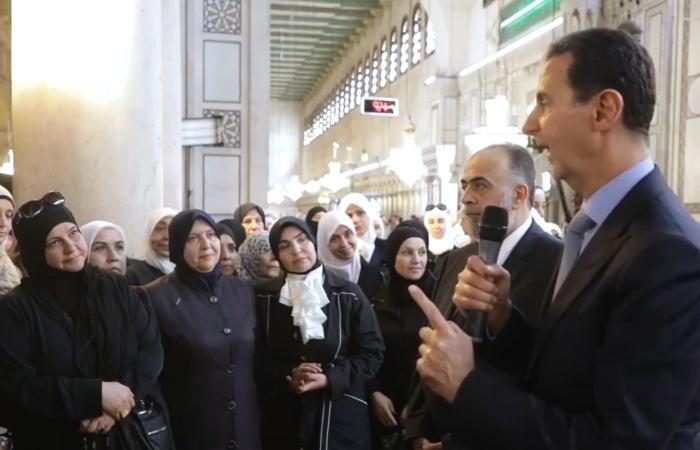The Syrian preacher, Munira Al-Qubaisi, founder of the group “Al QubaisiyatReligious today, Monday December 26, in the capital, Damascus, at the age of 89.
The Ministry of Awqaf in the government of the Syrian regime mourned Al-Qubaisi through “FacebookBy saying, “The Syrian Arab Republic mourns for you the virtuous educator and the able teacher, Hajja Munira Al-Qubaisi.”
Her name topped the social networking sites among those who mourn her and those who criticize her because of the positions of the “Qubaisiyat” group in support of the regime during the past years.
Al-Qubaisi mourned religious figures and figures in the Syrian opposition, such as the former head of the “Syrian National Opposition Coalition,” Ahmed https://twitter.com/Mouaz_AlKhatib/status/1607281792515706881 Al-Khatib, andDr Syrian in Islamic Thought Abdul Karim Bakkar.
Who is Munira Al Qubaisi?
Munira Al Qubaisi was born in MedinaDamascusIn 1933, she graduated from the University of Damascus in the Department of Natural Sciences, and practiced the profession of teaching in the Al-Muhajireen neighborhood.
At the beginning of the sixties, Al-Qubaisi began practicing advocacy activity with the educationalist, due to her proximity to the “Abu Al-Nour” mosque of the late Mufti of Syria Ahmed Kaftaro, who is famous for following the “Naqshbandi Sufism” method, and close to the former president of the regime, Hafez al-Assad.
The general tendency of the Syrian regime in the eighties and the beginning of the nineties was to exclude all those involved in advocacy activity from teaching in public schools, which contributed to Al-Qubaisi’s tendency to learn from Kaftaru, and her tendency to study Sharia sciences at the Faculty of Sharia at the University of “Damascus.”
Al-Qubaisi’s da’wah began among its female students in Damascus schools, especially girls from large and wealthy Damascene families. Religious lessons were concentrated in the wealthy areas of the capital, to spread later to all parts of Damascus, its countryside, Aleppo, Homs, and other provinces, and the group’s name would later extend outside Syria.
What are “Qubaysiat”?
An Islamic religious group, with Sufi roots, which gained its name from its founder, Munira Al-Qubaisi. Membership in it is limited to women. It is active in the centers of Syrian cities, and in Damascus and Homs in particular.
The movement increased its activity, and began to appear in public, from religious lessons to the Prophet’s birthdays and celebrations, and other religious and social events, and aimed at religious education and the dissemination of Islamic morals among groups of women.
The Qubaisiyat’s activities are mainly concentrated in Syria, as well as in Lebanon, Palestine, Jordan, the Gulf states, and in Europe and America as well, but under different names.
The meeting of the head of the Syrian regime, Bashar al-Assad, with female teachers of the Noble Qur’an and Sharia education – December 16, 2019 (Syrian Ministry of Endowments / Facebook)
Administrative hierarchy
In 2017, the Bridges for Studies Center issuedstudy Under the title “The Qubaisiyyat Community.. Origin and Formation”, during which he clarified the structural hierarchy of the “Qubaisiyyat” and it was:
The “pilgrims”: They are the first class, the central nucleus, and the final reference that manages the group and its circles, sets plans and programs, supervises general implementation, reports are submitted to them, and the ladies refer to them in all their affairs, and female students can only reach them after going through a period of time of commitment to the group. And special commendations, steadfastness in perseverance, and the emergence of absolute loyalty to the group.
– “Misses” (great aunts): They are the executive arm of the plans and programmes, and they bear the responsibility of attracting and reaching the target segments. Here lies a hierarchical series of young ladies who are distinguished by the colors of their headscarves, from sky blue to dark blue and the degrees between them.
– “Mouridat” (students): They are the base on which the group relies in its work, and the target segment, and it is framed in circles, each of which follows a female in a manner similar to the “organizational cell” that meets periodically, and a studied and decided curriculum is presented to it from the “great ladies” or “Hajjat”, and they move ascendingly from one lady to another, i.e. to a new episode after fulfilling certain conditions and completing specific curricula.
next to the lion
The head of the Syrian regime, Bashar al-Assad, paid attention to the “Qubaysiyyat”, especially after the beginning of the Syrian revolution in 2011, and allowed the group’s activities to increase in an unprecedented way after 2012, as the head of the regime is keen to subjugate religious institutions and appear alongside clerics on various occasions. To deliver messages internally and externally.
And themet Bashar al-Assad with the teachers of the Qur’an and women’s legal education in Islamic schools after the end of the celebration of the Prophet’s birthday in the “Umayyad” mosque in Damascus, on the 9th of last October, and he talked about their participation in this celebration for the first time, that “the presence of female teachers with us in this religious celebration is The normal thing.”
In December 2019, al-Assad met with dozens of preachers and Quran teachers from the “Qubaisiyat,” with the aim of “strengthening society from within, and confronting the misconceptions and misconceptions carried by terrorist organizations,” according to what was reported by the Syrian News Agency (SANA).
With the beginning of the Syrian revolution, large numbers of the group’s female students defected from it and established an assembly fired It is called “The Women of the Revolution, Dissidents from the Qubaysiyyat Organization.”
At that time, the female dissidents began publishing their memoirs with the “Qubaisiyyat” movement, and the statement of their defection stated, “We declare our innocence from what is published in the media and through social networking sites, including videos and reports that are contrary to Islamic morals, and accusations with low meanings that we do not know about (Qubaisiyyat). Our defection was and still is related to orientation, thought and methodology, and not for moral reasons.”
Some of the Qubaysiyyat were nominated for theThe parlamentAs representatives of women in Damascus, the most prominent candidate was Farah Hamsho, who succeeded in reaching the council through the “Damascus Al-Sham” list.
The slogan of her campaign was “renouncing extremism and consolidating the principle of ethics in dealings.” Farah is a relative of the famous businessman, Muhammad Hamsho, a friend of Bashar al-Assad and his cousin Rami Makhlouf, with whom he shares a number of companies and economic projects that have dominated the Syrian economy for years.
The meeting of the head of the Syrian regime, Bashar al-Assad, with teachers of the Qur’an and women’s legal education in Islamic schools after the end of the celebration of the Prophet’s birthday in the “Umayyad” Mosque in Damascus – October 9, 2022 (Presidency of the Republic / Facebook page)
There are no “Qubaysiat”
The regime refused to call this group “Al-Qubaysiyyat”. In May 2018, the Ministry of Religious Endowments issued statement In it, she said that there is no organization called “Al-Qubaysiyyat” in Syria, but there are female Quran teachers.
The statement stated that the name “Qubaysiyyat” dates back to a certain period and no longer exists, adding that their work is limited to memorizing the Qur’an and interpreting it in mosques, as they work according to licenses from the ministry.
The ministry’s statement came at the time after the circulation of a video recording, which was widely circulated on social media, of women inside the “Umayyad” mosque. It was said that they were from the “Qubaysiyyat” and chanted with a license from the Syrian Ministry of Religious Endowments. However, the video dates back to 2014.
According to the statement, the “Qubaysiyyat” “do not receive any salary from the Ministry of Awqaf. Rather, they are volunteers and work under the supervision of the Ministry. They are not a substitute for the Women’s Union, and they have absolutely nothing to do with this field.”
The Ministry of Religious Endowments praised the role of the “Qubaysiyyat” during the last seven years in Syria, saying, “They had a pioneering role in defending the state and the unity of the homeland.”
Also read: A white veil and a dark blue skirt.. Seven years among the Qubaisiyyat“
–



